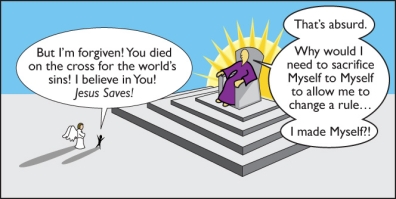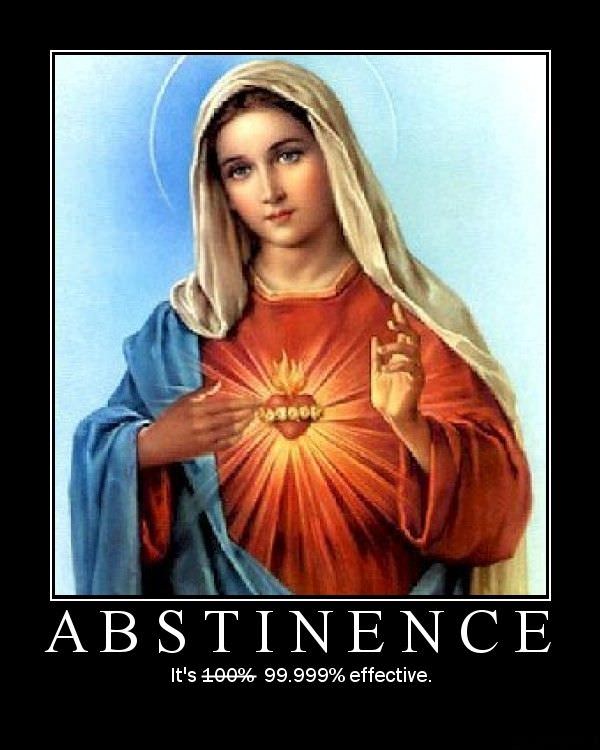In Sam Harris’ newest article (actually the text of a speech he gave at the Atheist Alliance Conference in Washington, D.C.), he makes an impassioned plea that atheists should not be known as such. Or, more properly, that they should not self-identify as an atheist. I recommend you read the entire speech, he makes a good case. I find myself in an unusual position in that I disagree wholeheartedly with him on this issue. I thought I disagreed with him in the past, but I was wrong. He was absolutely correct, and I was won over through the strength of his arguments. Not so, this time.
The main thrust of his argument is encapsulated in this quotation:
. . . We should not call ourselves ‘atheists.’ We should not call ourselves ‘secularists.’ We should not call ourselves ‘humanists,’ or ‘secular humanists,’ or ‘naturalists,’ or ‘skeptics,’ or ‘anti-theists,’ or ‘rationalists,’ or ‘freethinkers,’ or ‘brights.’ We should not call ourselves anything. We should go under the radar—for the rest of our lives. And while there, we should be decent, responsible people who destroy bad ideas wherever we find them.
He spends some time explaining that “atheist” is, at its root, an expression of negation, which makes it somewhat useless as a way to define oneself, especially vis-à-vis other people. Quoting Sam, “I think that ‘atheist’ is a term that we do not need, in the same way that we don’t need a word for someone who rejects astrology. We simply do not call people ‘non-astrologers.’” Further, he explains that racism used to be a widespread, everyday phenomenon in the United States. Even horrific, violent, deeply entrenched and institutionalized racism was not as rare as we would like to think. He explains that "there have been important, and I think, irrevocable changes in the way we talk about race. . . how many people have had to identify themselves as 'non-racists' to participate in this process?" Unfortunately, although all of this makes sense on the face of it, casual thought on the matter makes me realize that it's too facile to serve as a good metaphor for the struggle against theism.
First, while calling oneself an atheist is probably a useless way to define oneself in a vacuum, we do not live in a vacuum. There would be no need for a term like “atheist” if there were no “theists”, but that is not the world in which we find ourselves, no matter how desperately we wish it were. Whether atheism is a burgeoning movement or not remains to be seen, but I’d like to think of it as a revolution of sorts. And revolutions are inherently anti- status quo. Mr. Harris makes an intellectual gyration here, and insists that we should stand for reason and common sense, rather than against religion or ‘god(s)’ per se. Movements (revolutions?) are sometimes best defined in terms of what they are opposed to. Mr. Harris says that "atheism is not a worldview," but I'm afraid it is. Since I woke up and realized I was atheist, my worldview has been dramatically altered. It is a global change in the way I view everything-- the metaphors I use, the way I reflect on my actions and consequences of those actions, my political ideas, what is important to focus upon in my life, etc... If that is not a worldview, I don't know what else to call it.
This brings me to a related point. Many atheists are proud of the fact that they are atheists. There are extensive lines of bumper stickers, t-shirts, and related merchandise available to proclaim one’s lack of belief in the supernatural. I strongly doubt that a t-shirt or coffee mug reading "pro-reason" would command similar sales figures to those reading "godless atheist," "evildoer," "heretic," or "infidel". I also doubt that if one were to ask Sam Harris, "Are you an atheist?" that he would respond "No, but please allow me to tell you about reason and science".
Perhaps I should also explain that one of the primary reasons that Mr. Harris gives for preferring not to be so easily labeled is that people make assumptions based on those labels. As atheists, we are mind-numbingly aware of all of the arguments that believers use to attack us or shore up their defenses. I think Mr. Harris tires of responding to the same arguments over and over again, even though he has attempted to pre-empt so many of them with his other writing. As such, he's throwing in the towel; it's harder to attack something if you aren't sure what it is. From his perspective, it is so much easier for society as a whole to dismiss us as the lunatic fringe or to use canned arguments or sound-bite attacks against us once they know that we are "atheists". We should be "under the radar", it's safer that way. It seems to me this is completely backwards. The gay-pride movement did not start to gain any momentum until it became known as "gay-pride". The refusal to go away, the insistence on one's rights (even while in the minority), the appeal to change society at large-- these are all the hallmarks of great social movements. It's how monumental change occurs. This is the real reason why I can't support Mr. Harris' racism analogy: change occurred because people stood up and vociferously argued for what they believed in. It did not occur because there was an amorphous group of people that realized that racism was wrong and stealthily changed society. The civil-rights movement got loud, got organized, they made people uncomfortable, they made society change. It does not matter if this self-identification made it easier for racists to label them, or to use canned arguments to keep them in their place. They changed society because it was the right thing to do, and not just for themselves individually, but for society as a whole. This is the true heritage that atheists should lay claim to. Instead, we are too busy squabbling over the myriad ways we could name ourselves, or give ourselves a symbol (ostensibly to identify ourselves to one another), or which atheist group would be best to join. It's this tiresome rehashing of nomenclature that Mr. Harris alludes to in the first quotation above, but instead of advocating that people take action to make change occur, he changes the naming debate marginally.
Mr. Harris then changes tack, and argues that we should use this approach of stealth-atheism is we are more likely to win any given battle if we ally ourselves with those of faith with whom we might agree on any given situation. He uses the example of Mormonism. Atheists may have something in common with mainstream xians, in that neither one of us believes Mormonism is true. Therefore, we ought to somehow combine forces with those that agree with us, in some "enemy-of-my-enemy-is-my-friend" shady logic. Quoting Harris again, "to be consistent as atheists, we must oppose, or seem to oppose, all faith claims equally. This is a waste of precious time and energy, and it squanders the trust of people who would otherwise agree with us on specific issues." This may be true, but only so far as those who agree with us on specific issues are willing to ally with us. Once we've eradicated those pesky Mormons (or Muslims), then what? Who's next? I submit it's far better to avoid settling for half-measures when we could obtain the whole ball of wax. Obviously, we must have our priorities, but they shouldn't come at the expense of our identity. Making deals with the proverbial "devil" never works out the way we think it will.
Mr. Harris then moves on to advocating a return to reason in our daily interactions, which I wholeheartedly agree with. "Nobody wants to believe things on bad evidence. The desire to know what is actually going on in [sic] world is very difficult to argue with. In so far as we represent that desire, we become difficult to argue with." The problem with this is that people believe things for bad evidence all the time. People just don't think that they are the ones with bad evidence. For many, "the bible says so" or "my pastor says so" or "my friends/parents say so" is the highest evidentiary standard. For these people, it's incomprehensible that there are people in the world that don't believe in the bible. Even more difficult then, would be a debate with these folks as to solutions to problems such as global warming (See related Wall Street Journal article). It seems that there is some debate in the evangelical xian community what to do about global warming, both sides claim a biblical imperative for their solution. (By the way, the two solutions are to 1- do nothing, 2 - do something.) Everyone on both sides are convinced that they have the best of reasons for what they believe. To me, as an outsider, I think their reasons for debate are inane, but try convincing them of that.
The article winds up with a rather large exploration into the metaphysics of experience and the value of meditation, which I have no qualms with, followed by Mr. Harris' vision of what victory in this struggle would look like. "We will have won this war of ideas against religion when atheism is scarcely intelligible as a concept. We will simply find ourselves in a world in which people cease to praise one another for pretending to know things they do not know." Almost by fiat, he believes, this world will come about if we insist upon reason, rather than "atheist". While it's certainly a very worthy long-term goal, for now I will settle for rational national policy. I don't care if everyone wants to believe in god or buddha or Russell's teapot, so long as we can have stem cell research, a change in our foreign policy, gay marriage, etc... Laws, policies, the long-term direction of society is what we ought to be concerned with, not this relentless back-and-forth about what we ought to be called. Although Mr. Harris recognizes that racism still exists, he seems to believe (again by fiat) that eventually things will all be pollyanna, that "it will be a world in which the very concept of separate races has lost its meaning." A worthy and noble objective, but for Rosa Parks, it was enough to say "I will not give up my seat."
I would like to leave this subject with a few closing thoughts. As one of the comments from the website on which the speech was posted has pointed out, atheism can be a tough sell. Nobody likes an atheist, at least when the think of us as morose determinists with no joy in this nasty, brutish, short life on a lonely planet in a vast and meaningless cosmos. Mr. Harris' attempt to shoehorn the topic of metaphysical experience and meditation into this speech is his answer to this, along with avoiding the term "atheist" whenever possible. My answer is to shout from the rooftops the overwhelming relief that comes with realizing there is no omniscient judge (nay, voyeur) over all of my actions. There are no great scales on which my life will be judged. Think of all those times that I didn't keep the sabbath day holy, or when I coveted my neighbor's ox, or told a little white lie to make someone feel better. If all of those things counted against me, I'd surely be in trouble. Luckily, it's so much easier to go through life trying to do the right thing as best I can, making mistakes, learning from mistakes, and trying to do better the next day. If I also had to worry about violating dogma lest my eternal soul be in peril, I don't know how I'd continue to make it through every day.
All this being said, I fully agree that words have meaning. We shouldn't casually throw terms like "atheist" around, especially if that is not what we intend. I don't see what is damaging about saying I am an atheist. I believe the feminists have it right when they say that the English language (at least the way it is commonly used) helps entrench sexism. But, call me crazy, I also think that "In God We Trust" should be taken off our money if we mean what we say in the Constitution (or at least the First Amendment). By the way, I believe that the First Amendment does allow for freedom FROM religion, not just freedom OF religion, but that's another blog.
Finally, it's been said that there are two sides to every argument. I think that one (or both) sides usually try to reduce the argument to trite sloganeering and mis-characterization of the other position. However, that doesn't devalue the worth of the arguments, and it only convinces those that don't have a dog in that particular fight. Once people realize that this is a struggle that has immense ramifications for society as well as themselves and take the time to examine their position, hopefully the useless round-and-round that we go through with theists will disappear as they begin to question the reasons they believe what they do, and thereby the implications for our national policy.

















